3 Feb 2014 | Greece, News and features, Politics and Society
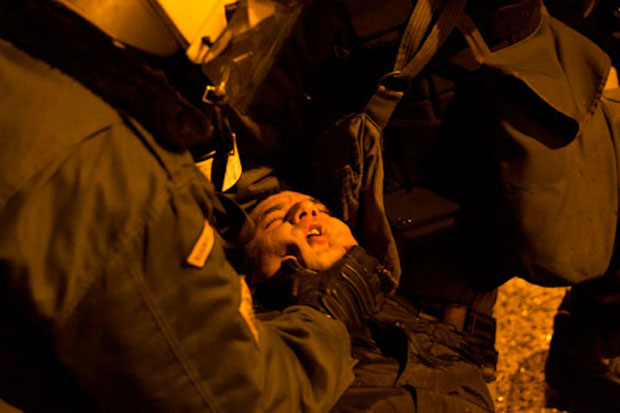
Unconscious protester dragged by police during an anti-fascist demonstration (Image: Nikolas Georgiou)
Following the reappearance of Golden Dawn’s “battalion squads” last week in Keratsini, where hip hop artist Pavlos Fyssas was murdered, antifascist rallies and demos are increasingly met with state repression and police violence.
On 25 January, a group of 80-100 neo-fascists took down a banner in Fyssas’ honour and attacked a self-managed hangout called “Resalto”. As documented on social media, the riot police merely looked on during the attack.
On Saturday 1 February, two protests, one from anti-fascists and anarchists, and one from Golden Dawn, were planned at different locations in the centre of Athens.
Anti-fascists were calling for a rally in protest at Golden Dawn’s disrespect to Pavlos Fyssas, as well as the refugee tragedy at Farmakonisi, an alleged pushback operation which had already prompted an investigation and led to condemnation from international human rights organisations.
Golden Dawn had called for its annual march at the Imia memorial. Members and supporters of the party gathered to commemorate the Imia crisis in 1996, a conflict between Greece and Turkey over two small rocky islands during which three Greek navy officers died.
Even though the police had banned all marches — though not rallies — “for reasons of public safety”, Golden Dawn defied the ban and marched through central Athens. There was no intervention from the police.
Elsewhere in the capital, at Syntagma Square, clashes broke out between protesters and the police when two men with Greek flags on their jacket were spotted and chased down. One of them managed to escape through the riot police and the other one was attacked and injured slightly. Despite anti-fascist efforts to safeguard the rally, riot police dispersed the protesters using stun grenades and tear gas. Some protesters were arrested.
Nikolas Georgiou, an independent photojournalist, witnessed an unconscious man being dragged by police.
“They had him in handcuffs and he had already passed out when they started dragging him. It was only when a colleague of mine told them that he was not breathing, that they seemed to worry,” Georgiou told Index on Censorship.
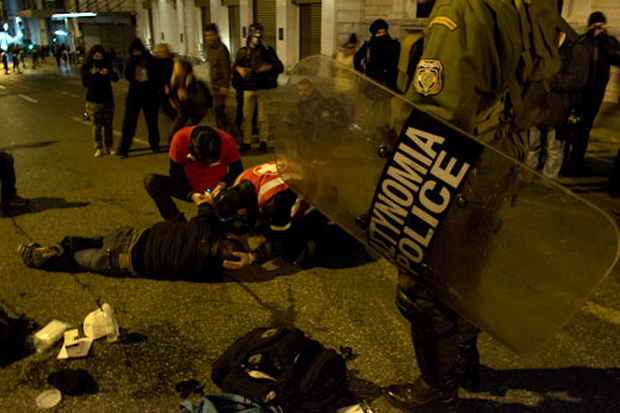
Police clashed with anti-fascist protesters in Athens. (Photo: Nikolas Georgiou)
When a member of parliament asked riot police to explain the incident, the answer given was that the protester had “slipped and he fell”.
The man, a Turkish refugee named Saltchuk Gungor, was transferred to the Georgios Genimatas Hospital under close supervision of riot police squads.
People expressing solidarity with Gungor complained about the police presence, while Syriza’s MP Afroditi Stampouli denounced the incident as “unacceptable for democracy”.
Gungor is being charged with the felony of assaulting police officers while having his face covered. He, however, denies the charges: “I didn’t do anything. I was attacked without a reason. They hit me and they dragged me down,” he stated on the website left.gr. Photos taken by witnesses show that Gungor did not have his face covered.
The clashes did not stop at Syntagma Square. Police squads chased anti-fascists at the Monastiraki subway station. They used tear gas amid commuters and chased people through the subway rails.
Golden Dawn also announced its “plan B” at Saturday’s rally — the founding of a party called “National Dawn”. If the government decides to continue the ban of Golden Dawn, the new party will serve as an alternative.
Half of Golden Dawn MP’s are being prosecuted with charges of being part of “a criminal organization”, and one third are now in jail.
This article was posted on 3 February 2014 at indexoncensorship.org
22 Jan 2014 | Greece, News and features, Religion and Culture
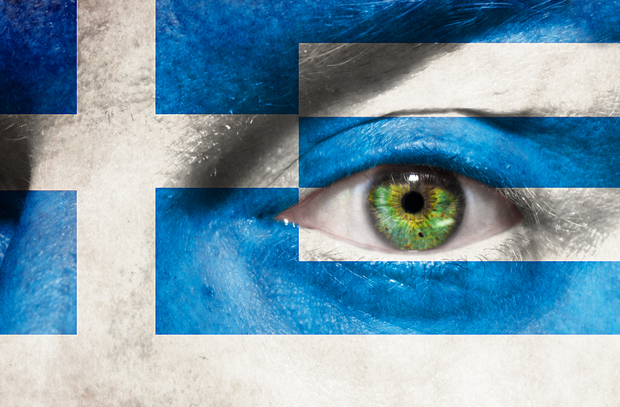
(Photo illustration: Shutterstock)
A Greek man felt the wrath of his country’s outdated blasphemy laws after satirising a Greek Orthodox monk on a Facebook page he created. The administrator of the social networking page, Filippos Loizos, 28, was handed a 10 month prison sentence after he used a play on words to compare the late Father Paisios to a traditional pasta-based dish. His arrest in 2012 saw online communities erupt as thousands of Greeks took to social networks to protest his detention.
According to the Atheist Union of Greece, the popularity of Loizos’ Facebook page following his satirical remark angered right wing and religious groups in the country. Golden Dawn, the now banned Greek neo-fascist party, took advantage of the uproar by raising a question in parliament about Loizos and his violations of two Greek laws covering blasphemy and insulting religion. Ultimately Loizos was arrested.
Loizos’ case is not the first of its kind. The Union has now called upon the Commissioner for Human Rights for the Council of Europe, Nils Muižnieks, to repeal Articles 198 and 199 of the Greek Penal Code.
Article 198 punishes any public and malicious blasphemy against God with a maximum of two years imprisonment, three months’ for the public “manifest of a lack of respect for the divinity”. Article 199 covers a broader religious spectrum and offers two years’ jail time for “one who publically and maliciously and by any means blasphemes the Greek Orthodox Church or any other religion tolerable in Greece”.
In a letter sent to Commissioner Muižnieks the Union remarked: “The insult of religion, on the other hand does not harm any citizen, as does the case of insulting people. Only the followers of religions deserve respect and may be offended—not the religion itself—and criticism and/or satire of a religious belief is not identical to insulting persons having this belief.”
They claimed that any disturbance caused by Loizos’ page has been done so by the uncontrolled reactions of angry, religious fanatics who are merely using the Penal Code articles as an excuse to be disruptive. According to the European Court of Human Rights, case Handyside vs the United Kingdom, 1976 (and in many instances since) freedom of expression is a fundamental right in a free society and includes the right to criticize ideas, even when the criticism bothers holders of those ideas.
Loizos has appealed the ruling.
This article was posted on 22 January 2014 at indexoncensorship.org
19 Sep 2013 | Europe and Central Asia, Greece, News and features
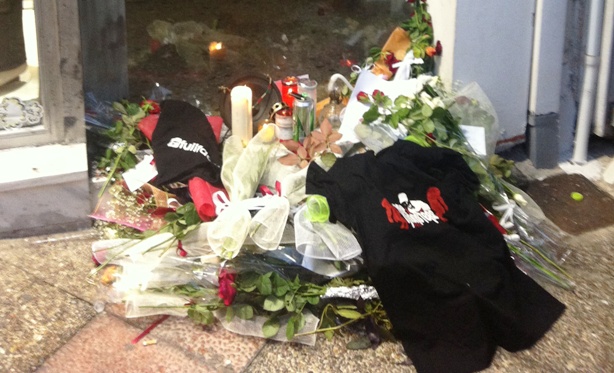
Tributes to murdered activist Pavlos Fyssas (pic: Christos Syllas-Dellis)
Thousands of protesters gathered on Wednesday evening in Athens near the place where Pavlos Fyssas, a 34 year-old antifascist hip hop artist was murdered by a Golden Dawn supporter.
“The blood is running, it seeks revenge”, they shouted, a slogan echoing the December 2008 riots , when 15 year-old student Alexandros Grigoropoulos was killed by two policemen.
The 45 year-old man who carried out the stabbing has told police that he was a supporter of far-right party Golden Dawn. This was clearly a politically motivated killing, added to a sequence of intimidation events and attacks carried out by Golden Dawn against immigrants and asylum seekers.
On 17 January, Shehzad Luqman, an immigrant worker from Pakistan was lethally stabbed by two men. Police later found pre-election pamphlets of Golden Dawn in the house of one perpetrator.
In December 2012, Amnesty International reported on this issue. In addition, Human Rights Watch has found that there is evidence connecting the attackers on immigrants with members of or affiliated with far-right groups such as Golden Dawn.
No matter how useful these findings may be, they were clearly not at the “agenda” of the rally at Keratsini. Young and old antifascists, together with immigrants, have been increasingly struggling with Golden Dawn vigilantes in the past five years. The murder of Fyssas comes as no surprise. A lot of people somehow anticipated the tragic event.
“The regime, in co-operation with Golden Dawn is clearly escalating the confrontation with political dissidents. This is why we’re here today. And we have to step up the intensity of this political struggle. Everywhere,” said a demonstrator, local resident of Keratsini.
Some 3,000 – 4,000 members of an organised anarchist block was heading towards Golden Dawns’ offices in Nikaia, while at the same time, demonstrators attacked Keratsini’s police station. Almost instantly clashes began: Riot police squads tried to disperse groups of demonstrators with the typical use of excessive force.
In an alley, the head of a police squad was heard shouting “Come on, let’s go and fuck them up”. Middle-aged people from the neighborhood curesed them, while young antifascists threw Molotov cocktails and stones.
Keratsini district, a working class neighborhood, was established after Greek refugees fled Asia Minor on 1922. The greater area of Piraeus (Nikaia, Perama, Keratsin), known for its anti-Nazi struggle, was historically affiliated with the political left.
This picture though seems to be fading away. According to polling company “Public Issue”, Golden Dawn has doubled its electoral influence on these areas. Moreover, it has worked its way on socially penetrating existing political views.
On June 2012, Egyptian fishermen were attacked in Perama after an inflammatory and racist speech by Golden Dawn MP Yannis Lagos, who said that the party would hold them accountable for their actions. A few days ago, again in Perama, members of the Communist Party (KKE) were brutally attacked by Golden Dawn’s supporters while putting up posters for an upcoming festival.
Last nights’ clashes have led to a total of 130 detentions and 34 arrests while tweeters were reporting a demonstrator had been heavily injured by a direct teargas shot. Questions about the way police responded at the place of the assassination remain unanswered. Witnesses on TV broadcasts this morning said that police were reluctant to involve at the fight before the stabbing.
There were protests against the murder throughout the country. Latest reports suggest that there have been discussions on emergency legislation to ban Golden Dawn’s acts.
This article was originally published on 19 Sept 2013 at indexoncensorship.org
19 Aug 2013 | Greece, News and features, Politics and Society, Religion and Culture
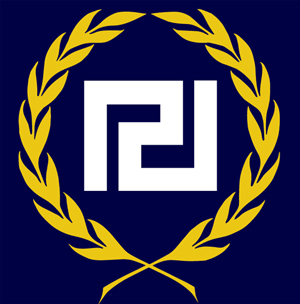 Media coverage of neo-fascist Golden Dawn’s activities in recent weeks has focused on the Nazi anthem played at a food distribution event the party held or the swatstika tattooed arm of a party spokesperson Ilias Kasidiaris. It’s all portrayed as another lifestyle, albeit with a fascist tint.
Media coverage of neo-fascist Golden Dawn’s activities in recent weeks has focused on the Nazi anthem played at a food distribution event the party held or the swatstika tattooed arm of a party spokesperson Ilias Kasidiaris. It’s all portrayed as another lifestyle, albeit with a fascist tint.
But these incidents are evidence of a continuing and alarming political reality that no Greek or European can turn a blind eye to.
It’s been argued that the fascism emerging today is the result of long-term political and social trends. Right wing populists, far rightists and independent extremists all share – more or less – a common principal: They see immigration, ethnic diversity and religious freedoms as a threat to national cohesion.
It is in this context that the neo-fascist party carries out its actions against groups that violate its perceptions of the Greek nation. These “dissidents” include anti-fascists, anarchists, leftists, homosexuals and immigrants. Since the outset of the economic crisis, the party has managed to persuade some of the impoverished middle and working classes that it speaks for them.
George Pleios, head of the Department of Communication and Media Studies Faculty at the University of Athens, has recently written about the political affinities of the “right” and the “far-right” spectrum and their culture of political intolerance, either in or outside parliament.
“There is a common ideological reservoir whereby far-right MPs and proponents of right-wing extremism express their political views and plan their political actions. For them national identity comes first. There is no room for individual rights. Nobody is entitled to any other belief than the nation and the race”.
Within Greece, there is speculation that New Democracy will cooperate with Golden Dawn at some point. Pleios considers that a possibility.
“Everything is possible. In that case, of course, many political compromises must be made. Both parties would never want to experience severe election loss”, he said.
Golden Dawn entered the Greek Parliament in 2012 with an unprecedented 6.92% of the vote. The party’s poll ratings have reached 18% in recent days. During this time, there has been a strong legitimisation of their rhetoric, mainly emanating from the right wing political spectrum.
At first glance, the picture one gets from the parliamentary discourse is that Golden Dawn is heavily criticized with its back against the wall. Not so long ago, there was discussion of banning the party. In May, the Greek Prime Minister Antonis Samaras held talks around an anti-racism bill that was aimed at slowing the growth of the party.
A more careful look though, suggests differently. According to a report from Dimitris Psarras, investigative journalist at “The Journalists’ Newspaper” (Efimerida Ton Sintakton), many far-rightists and junta nostalgics that survived politically throughout the years, today surround the Greek prime minister as associates, advisors or New Democracy party members.
Makis Voridis, recently appointed as special representative on migration to the OSCE Parliamentary Assembly, has been defending Savvas Hatziparaskeyas, publisher of the far-right newspaper “Stohos” and a strong supporter of Golden Dawn.
In the1980s Voridis served as secretary of EPEN’s youth wing, succeeding Nikos Michaloliakos, who is Golden Dawn’s general secretary. EPEN was a fascist party founded by Georgios Papadopoulos, the head of the military coup d’état, which ruled Greece from 1967-1974.
Another connection between some New Democracy members and Golden Dawn comes from the writings of Failos Kranidiotis, an unofficial advisor to Samaras. On 12 December 2012 Kranidiotis wrote that New Democracy should appeal to populist “Independent Greeks” as well as to Golden Dawn. “These are mainly our people”, he wrote.
A few months later, Panayotis Baltakos, the government’s general secretary, allegedly said that cooperation between New Democracy and Golden Dawn in upcoming elections is “undesirable but not an unlikely possibility”. Last December, Baltakos had told the National Commission for Human Rights that regarding the committee’s work on human rights and the country’s international obligations “he doesn’t care in his capacity as a representative of the government and New Democracy”.
On 1July, former minister Vironas Polydoras, when asked whether New Democracy should cooperate with the neo-fascist party said:
“Of course…”.
Moreover he insisted that the troika — the European Union, the International Monetary Fund and the European Central Bank– not Golden Dawn, poses the greatest threat to Greece.
In response, Anna Asimakopoulou, a spokesperson for New Democracy, said that the party “would never work with neonazis”.
Golden Dawn has also fostered relationships with some orthodox religious groups and bishops belonging to the Greek Orthodox Church. At the same time, the party has targeted performers and topics that it does not agree with.
In March 2013, journalist Matthaios Tsimitakis reported for Index on Censhorship what happened when the controversial theatrical play “Corpus Christi” went on stage:
“For about a month, the actors and other workers at the Hitirion Theatre had to take precautions to protect themselves from threats against their lives and violent attacks by Orthodox religious groups and Golden Dawn”.
Golden Dawn has made its position on the arts that don’t fit with the party’s philosophy clear.
“Abolition of state subsidies and the marginalization of the ‘artists’ that offend ethnic, religious and historical symbols”. – from a Golden Dawn political leaflet (p. 22)
Greek Orthodox clerics like Bishop Amvrosios of Kalavryta and Bishop Seraphim of Piraeus have openly expressed their support of Golden Dawn. Both of them have often spoken out against Jews and homosexuals, though their viewpoints are at odds with other members of the church hierarchy.
On 15 July, Amvrosios wrote on his blog that “we have to rise up” because “we have been sold out a long ago. We are Jewish occupied”. In an older post he writes about the “imminent threat” of Islam saying, “Islam does not play around”.
In much the same spirit, Golden Dawn’s rhetoric contains islamophobic and anti-semetic propaganda.
“1400 year old tradition of Jihad has reached Europe, as well as Greece, and is ready to conquer the continent and our country”, says a recent article on Golden Dawn’s official website entitled “Enemy at The Gates: Islam as a Trojan Horse of New Order”.
In June, the Muslim Association of Greece received a threatening note with the emblem of Golden Dawn printed on it. All Muslims, Greeks and foreigners, were given one month’s time (until 30 June) to leave the country otherwise they would be “slaughtered like chickens”.
Golden Dawn denied any connection with the note, calling it a provocation to the party.
Greece’s next legislative election is due to be held by 2016. What Golden Dawn’s role will be is an open question.
This article was originally published at on 19 Aug, 2013 indexoncensorship.org. Index on Censorship: The voice of free expression





 Media coverage of neo-fascist Golden Dawn’s activities in recent weeks has focused on the
Media coverage of neo-fascist Golden Dawn’s activities in recent weeks has focused on the